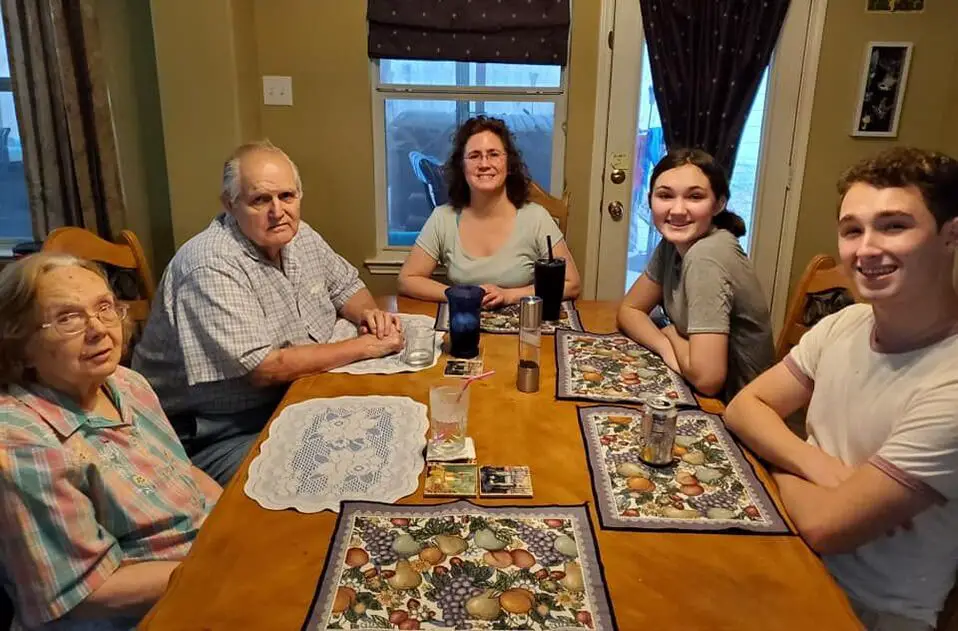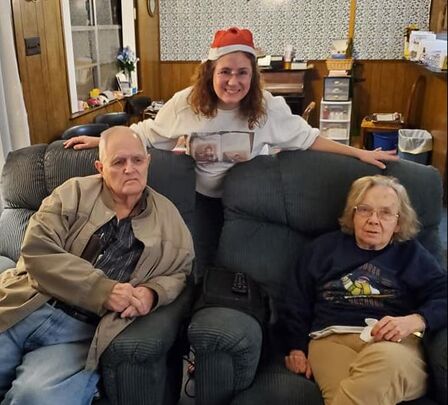|
Laura Bracher and I worked together for two years at my previous job. Our cubicles were in close proximity, so we saw each other daily and chatted often. One morning, not long after I started my job, Laura flew in like a tornado- later than normal and a bit frazzled. It was then I learned Laura was deep in the throes of caring for her parents, one of whom has severe dementia. Three years later, she is still caring for her parents while juggling two teenage kiddos and a full-time job. A few months ago, Laura unexpectedly lost her husband after his brief battle with cancer. To say Laura has been through a lot is an understatement. She is beyond tough, keeps a positive attitude and a friendly demeanor, and I am honored she agreed to speak with me about her role as a caregiver. Brooke: Generally speaking, what ailments are your parents currently struggling with? Laura: My mom has severe dementia. She is non-verbal and requires help in every area of life. My dad’s overall health is poor, but his mind is still sharp. He has battled circulatory and a variety of other health issues for years and is now unable to walk. He requires a wheelchair or motorized cart for mobility. Brooke: How long has your mother been battling dementia? When did you start to notice her symptoms? At what point did you decide to see a doctor about it? Laura: Mom started showing signs of dementia about eight years ago. She couldn’t find her way home from my son’s soccer game not far from her own home of 43 years. She also started passing up her own house once she was on her street. About four years ago, she suffered a stroke, which really brought her health down quickly. We really didn’t see a doctor about her condition until the time when we needed a doctor’s official note for financial/legal needs. I already had power of attorney on her, but needed the official medical note. Brooke: You have tried a few different living and home health care arrangements to balance your parents’ needs and comfort. What is their current living arrangement? Do you have outside help? Laura: I have tried my best to keep my parents in their own home, so they don’t have to suffer any more major life changes. When my mom had her stroke, however, we were forced to put her in a nursing home where she could receive around-the-clock care. This did not go well for either of my parents. After she recovered a bit from her stroke, we were able to bring her back home to be with my dad in their own home. We found a wonderful daytime caregiver who helps Monday through Friday from 9am to 6pm each day, and Saturday afternoons. I go to their home each Saturday and Sunday morning to change Mom and get them fed and set up for the day. I then come back Sunday evening for certain weekly household needs – setting up their weekly medications, taking out garbage for pickup which comes before caretaker arrives, dinner, general other. I try to find fun activities we can still do together like go out to lunch, take them to a museum, etc. It’s harder now that I have to push both dad in his wheelchair and mom in her rolling walker. Brooke: What has been the most difficult aspect of caring for your parents? Laura: This is going to be different for everyone. I have no problem with changing my mom’s diapers/clothing and helping her brush her teeth, but that could be difficult for many to see their parent as a child. While she recognizes me because I’m there frequently, I understand when she says or does something that clearly shows she does not know things. I try to take her perspective and not take it personally. This is no longer the mother I knew. The disease has already taken her, slowly. I feel I have already said my goodbyes and caring for her now is my privilege to give back to her all the efforts she gave to me growing up. I won’t say this is not hard, but it’s the circle of life. The most difficult thing is watching my father deal with her situation. He absolutely does not understand and cannot separate his emotions and memories. He still thinks of her as the strong, intellectual woman she was when they married. After almost 60 years of marriage, to not be able to have a conversation with the one he loves is too much to take. So the downward spiral into depression and drinking has been very hard. Trying to get “Archie Bunker” to move into the 21st century of understanding is impossible. Trying to teach someone who is not a socially interactive person, to be cognizant of another’s needs is challenging. It’s actually harder to deal with his emotions than her physical challenges. Brooke: Obviously, you are in the middle of a daily battle- in more ways than one. What keeps you going? What helps keep your head up? How do you find your strength? Laura: Honestly, I don’t have a choice. My brother lives in North Carolina, so I have to do this on my own. They are my parents, so I do what I have to do. I really never stop to think about it. I just keep moving. My kids are teenagers, so their schedules and activities keep me insanely busy on top of taking care of my parents. While overwhelming, my kids are my rock. They keep me going. I think being involved with them helps get me through. Until my husband’s passing, he helped with our own household to allow me to have the time with my parents. Now it’s routine. Plus, I have a church family and a faith that I depend on. Brooke: Many of my readers are seeking knowledge and support in dealing with parents with dementia. What has been a great resource for you in learning more about your mother’s condition? Laura: In the beginning, when Mom was first diagnosed, I read a lot. I read everything I could. I also asked the doctors and the caregivers as many questions as I could. The nurses were the best for tips. I am still learning from her daytime caregiver. As my parents change or their conditions digress, I continue to seek out helpful information. I also talked to friends and co-workers about their parents, and found some surprising answers. I wound up having to push to ask the doctors for medications that help slow the progress of dementia that they surprisingly did not automatically offer. I thought doctors wanted to push medications, but I had to ask. Anti-anxiety medications, including over the counter, have been extremely helpful to calm outbursts. Brooke: What is the most helpful thing a friend or family member has done for you? Some of my readers are looking for ways to help their friends who are caring for parents with dementia. Laura: I love it when my friends offer specific help. For example, a neighbor asked if he could help mow the lawn recently. I told him I could handle the mower, but I couldn’t handle the weed-eater, so I mowed and he took care of the weed-eating. Instead of offering general help, the best help they can give me right now is to take specific action. Sometimes I don’t know what I need because I’m just trying to get through the day. When someone else knows what I need and does it for me, that’s what helps. One of the best things was a friend offering her handyman for a variety of things around the house. My parents also need house repairs. It’s hard to juggle two households. So that’s huge! The current environment of delivering groceries is also a bonus! I don’t have to do as much shopping for them. Brooke: What is the one thing you wish you had known before your parents aged to the point where your lives changed because of it? Laura: I wish I’d known how important it was for my parents to have a social circle. My mom was a scout leader for 30 years, and my dad served for several years on his homeowner’s association for social interaction. But neither of them ever developed true friendships from these groups or other parents or even colleagues. They need friends and activities as they age, and the earlier they build these relationships, the better. Since Dad is now in a wheelchair, he is extremely limited in his activities. The only social exposure he gets is when he goes to the grocery store and rides around in the electric cart. He does not have friends to call or spend time with, so he relies on me for entertainment. I am too exhausted to entertain him all day every day even though I wish I could. Since my mom is no longer conversational, my dad gets very lonely. Dad never anticipated this situation. He thought they would continue having conversations into their declining years, or that he’d go before her and not have to deal with being alone, so he never built a social safety net. Mom is the love of his life, and he doesn’t even want anyone else, but now he feels truly alone. I just really wish I’d encouraged them to be more social earlier in life. Brooke: What’s your best piece of advice to anyone reading who may be caring for a loved one with dementia? Laura: Learn about their conditions, observe, and then adjust. When Mom started showing signs of Sundowners, I tried different things to help relieve her agitation. I realized that giving her Melatonin before bed helped keep her calm. Even though my mom cannot speak to me, I have watched her and interacted with her enough to know when something is bothering her or if she is trying to tell me something. If she is pointing at something, I will sometimes get behind her and look where she is pointing from her level. She may be pointing at a piece of paper on the floor. If that is the case, I’ve learned to simply pick it up, and she calms down. Simply slowing down and looking at her world from her perspective can help relieve her frustration and mine. --- PS. If you’d like to enter an everyday hero, like Laura, into our Caregiver Card Program, click here. It’s free, super quick to enter, and a great way to let someone know you appreciate them. Plus, you'll probably make their day a bit brighter. *This blog post may contain affiliate links, including Amazon affiliate links. These don’t cost you anything, but they allow us to continue running this site and providing free content for our readers.
0 Comments
Leave a Reply. |
Access Octomono Masonry Settings
Categories
All
|
|
ALL CONTENT © COPYRIGHT 2023 BROOKEWALKER.COM
|
MORE |
This site contains affiliate links, including Amazon Affiliate links. These links don't cost you anything, but they allow us to continue running this site and providing free content for our readers.



 RSS Feed
RSS Feed
